Gallie Day:
A Celebration of
Surgical Science
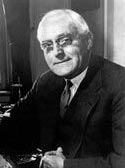
W.B. Gallie
|
Gallie Day celebrates
the memory and
accomplishments of
William Edward Gallie
who developed our
Department of Surgery
into the first fullycoordinated
training
program for young
surgeons in Canada.
Gallie was born in
Barrie, Ontario in
1882, the son of a building contractor. He graduated
from the University of Toronto and trained at
Toronto General Hospital and the Hospital for Sick
Children. He pioneered the use of “living sutures”
while serving in World War I, and was recognized
for his success treating fractures of spinal vertebrae.
Although he received many offers to work in the
United States, Gallie remained in Toronto, committed
to his goal of creating a systematic course
here so that Canadians no longer had to travel
abroad to complete their surgical training. His
devotion was not lost on his students who happily
called themselves “the Gallie slaves”. In 1937 they
formed the Gallie Club, meeting annually to present
major papers. For his birthday every January,
Dr. Gallie and his wife entertained his students
and former students, who would return from all
over the world for a reception in their home on
Teddington Park Blvd, overlooking the York Mills
ravine.
Julie Roorda
Assistant Editor 2004 - 2009
(with notes from Ernest Meyer and Toronto Star
columnist Donald Jones)
|
To introduce the 40th Gallie Day celebration, Professor
James Rutka reflected on the major social, medical, scientific
and political changes which have occurred over
the past 40 years. The theme of this year’s Gallie Day was
“Commercialization and Research”. Commercialization
and innovation are key to driving new discoveries and to
enable their translation into practical clinical solutions.
These goals embody the essence of what it means to be
an academic surgeon in 2014.
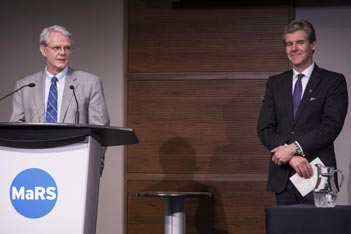
James Rutka and Michael Fehlings
The symposium speakers emphasized their passion
and commitment to their commercial ventures and
the pressing need for the surgeon scientist phenotype
to evolve if patients are to benefit from translation of
discoveries. Rafael Hofstein (PhD, President & CEO,
MaRS Innovation, MaRS Centre) presented his perspectives
in a lecture entitled “From Bench to Bedside: Best
Practices for commercialization”. Dr. Hofstein emphasized
the role that MaRS can play in facilitating translational
research and innovation. Milos R. Popovic (PhD, PEng,
Toronto Rehab Chair in Spinal Cord Injury Research)
described a 17-year long journey of developing a concept
for electrically stimulating functional upper limb
recovery from an idea to a Health Canada approved
product, which has gone global. His talk was entitled
“Commercialization: Where Brownian Motion Meets
Serendipity”. Michael Tymianski (MD PhD FRCSC,
Head, Division of Neurosurgery; Senior Scientist,
Division of Fundamental Neurobiology, TWRI-UHN),
talked about his biotherapeutics company (NoNo Inc)
dedicated to the research, development and commercialization
of a novel pharmaceutical PSD95 antagonist for
the treatment of stroke, traumatic brain injury, and pain.
His talk was entitled “Commercialization the Hard Way”.
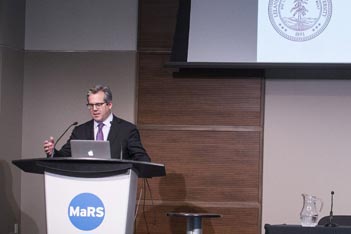
Paul Walker (MD PhD FRCSC, President & CEO,
Spectral Diagnostics Inc. and Past Surgeon-in-Chief at
UHN) discussed his unique path to developing a product
focused on improving outcomes in sepsis. His talk
was entitled “Why Commercialize Your Discovery - A View
From The Front Line”. Each of the speakers presented a
unique perspective but each emphasized the importance
of surgeons being involved and leading efforts directed
at innovation and commercialization.
This year’s Gordon Murray Lecturer was Geoffrey
C. Gurtner, MD (Professor and Associate Chairman of
Surgery, Professor [by courtesy] of Materials Science and
Engineering, Stanford University School of Medicine,
Stanford, CA USA). Dr. Gurtner’s talk was entitled “The
Art of the Practical: Translating Scientific Discovery into
the Real World”. The following words, provided by Dr.
Gurtner, summarize his key message: “It is well known
that surgeons have pioneered the technologies that have
transformed medicine. The treatment of coronary artery
disease, solid tumors and critically ill patients were
all developed by surgeons and were based on insights
gained in surgical research labs. However, as medicine
has become more complex, innovation has changed from
purely procedural (e.g. new operations) to more completely
new approaches to existing disease states (e.g. minimally
invasive valve replacement). Recently, new barriers to
innovation have also arisen including the corporatization
of intellectual property, increasing regulatory complexity,
rising health care costs and conflict of interest concerns.
These challenges have made it more difficult for practicing
surgeon-scientists to bring scientific advances into the
clinic. It seems likely that the successful practice of surgery
in the future will require a greater familiarity with the process
of technology development and an increased ability
to work with the private
sector. Understanding
how medical technology
is developed will be
required for surgeons to
move scientific discoveries
into the clinic. Hopefully,
these new skills will
allow surgeon-scientists
to remain leaders in the
advancing patient care
and medicine” (Geoffrey
C. Gurtner).
We had a record number
of abstracts submitted by trainees working with our
faculty. There were 10 platform presentations and 78
poster presentations. The Gallie Bateman Awards (for
Surgeon Scientist Training Program participants) and
the McMurrich Awards (for any trainee working with a
member of the faculty of surgery) were judged for both
platform presentations and poster presentations. The
range of assorted topics and researchers highlighted the
wide-ranging and tremendously high quality research
being conducted in our Department.
We had 10 superb oral presentations, which scored
highly. Surgeon Scientist Training Program (SSTP)
trainees are awarded the Gallie Bateman prizes.
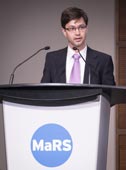
David Cadotte
|
First prize went David W. Cadotte (supervisor:
Michael G. Fehlings), for his oral presentation entitled
“Visualizing Structural and Functional Plasticity of the
Human Cervical Spinal Cord”. Jennica Platt (Natalie
Causarano, Nancy Baxter, Shaghayegh Bagher, Jennifer
Jones, Kelly A. Metcalfe, Stefan O.P. Hofer, Anne C.
O’Neill, Terry Cheng, Elizabeth Starenkyj, [supervisor:
Toni Zhong]) received second prize for her oral presentation
entitled, “Pre-Consultation Educational Group
Intervention to Improve Shared Decision-Making for Post-
Mastectomy Breast Reconstruction: A Pilot Randomized
Controlled Trial”. Third prize was awarded to Marisa
Louridas (Esther M. Bonrath, Dana A. Sinclair, Nicolas
J. Dedy, [supervisor: Teodor P. Grantcharov]) for her
oral presentation entitled “Mental Practice to Enhance
Advanced Laparoscopic Surgical Performance in the
Operating Room: A Randomized Controlled Trial”. The
fourth prize was awarded to Chethan Sathya (Paul
Wales, Damon Scales, Paul Karanicolas, [supervisor:
Avery B. Nathens]), for the poster presentation entitled
“Mortality among Injured Children Treated at Different
Trauma Center Types”.
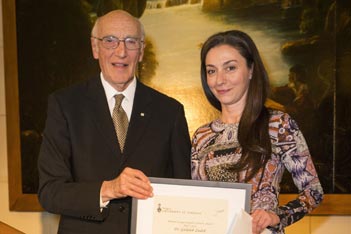
Gelareh Zadeh receiving the Bernard Langer Surgeon Scientist Training
Program Award from Bernard Langer
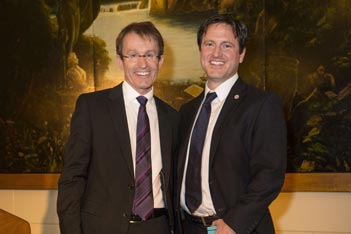
George Borschel receiving the George Armstrong Peters Prize from Chris
Forrest
|
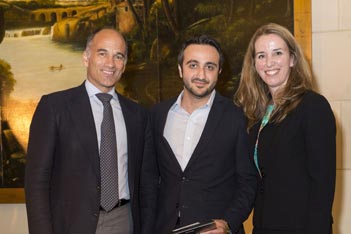
Left to right- Christopher Caldarone, Aria Fallah, and Marion Fazel
The McMurrich Awards are presented to research
trainees who are not in the Surgeon Scientist Training
Program). The first place award was won by Vijay
Ramaswamy (Supervisor: Michael D. Taylor) for his
oral presentation, entitled “Recurrence Patterns Differ
across Medulloblastoma Subgroups”. Shabana Amanda
Ali (Mushriq Al-Jazrawe, Heather Whetstone, Raymond
Poon, [supervisor: Benjamin A. Alman]) received second
prize for her oral presentation entitled “Cholesterol
Homeostasis Mediates Hedgehog Signaling in Chondrocytes
and Osteoarthritis”. Third prize was awarded to Kimberly
Lau (Hirotaka Tao, Haijiao Liu, Kendra Sturgeon,
Rodrigo Fernandez-Gonzalez, Yu Sun, [supervisor: Sevan
Hopyan]) for her oral presentation entitled “Anisotropic
Stress Orients Remodeling of Mammalian Limb Bud
Ectoderm”. Hae-Ra Cho (Hiroki Shimizu, Hiroaki Toba,
Sylvia Asa, [supervisor: Mingyao Liu]) received fourth
prize for the poster presentation entitled “Deficiency of
a Novel Adaptor Protein, Xb130, Is Associated with the
Development of Severe Multinodular Goiter”.
Faculty research awards went to Gelareh Zadeh -
Bernard Langer Surgeon Scientist Training Program
Award - awarded to an outstanding graduate of the Surgeon
Scientist Training Program in the Department who shows
the greatest promise for a career in academic surgery;
Gregory Borschel - George-Armstrong Peters Prize -
awarded to a young investigator who has shown outstanding
productivity during his initial period as an independent
investigator as evidenced by research publications in peer
reviewed journals, grants held, and students trained; Avery
Nathens - Charles Tator Surgeon Scientist Mentoring
Award - recognizing individuals supervising participants in
the SSTP who emulate Professor Tator’s qualities, namely
excellence in research, commitment to SSTP mentoring
and dedication to promotion of Surgeon-Scientists;
Laurence Klotz -Lister Prize - awarded to an investigator
who has shown outstanding and continuing productivity of
international stature as evidenced by research publications,
grants held, students trained and other evidence of stature
of the work produced.
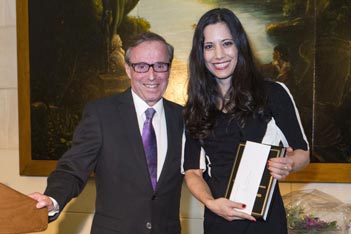
Niloofar Dehghan receiving the Zane Cohen Clinical Fellowship from Zane
Cohen
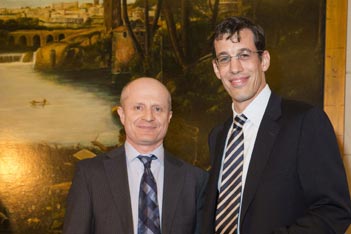
George Oreopolous (right) receiving the Surgical Skills Centre Award from
Oleg Safir
The fourth Shafie Fazel Award, established in memory
of Dr. Shafie Fazel, is presented to an individual who
has demonstrated outstanding accomplishments during
his/her residency both as a surgeon and as an investigator.
This was presented to Aria Fallah (PGY 6, Division of Neurosurgery).
The Zane Cohen Clinical Fellowship presented to a
clinical fellow who has practiced and achieved at the highest
level while being a clinical fellow in the Department
of Surgery, was awarded to Niloofar Dehghan (Division
of Orthopaedics). The Tovee Award is presented to an
academic staff member of the Department of Surgery
who has made the greatest contribution to the educational
activities of the Department, as exemplified by Dr.
E. Bruce Tovee during his outstanding career. This year’s
recipient of the Tovee Postgraduate Prize is Oleg Safir,
and new mom, Darlene Fenech received the Tovee Undergraduate Prize.
The Surgical Skills Centre Distinguished Educator
Award demonstrates the Centre’s commitment to surgical
skills education. This award recognizes those
individuals who have made exemplary, innovative contributions
to teaching and learning in the Surgical Skills
Centre over the past year. This was presented to George
Oreopoulos. The D.R. Wilson Award for teaching
is made annually to the surgical resident who is rated
by undergraduate students as an outstanding teacher.
Resident Justin Lee “demonstrated both a positive attitude
toward teaching and was considered a good surgical
role model for undergraduate medical students”.
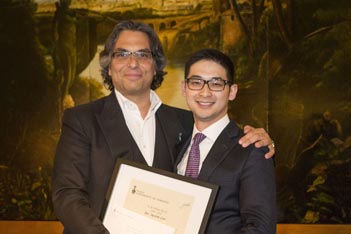
Justin Lee receiving the D.R. Wilson Award from Neil Fleshner
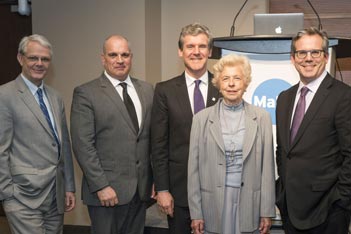
Left to right- James Rutka, Dimitri Anastakis, Michael Fehlings, Rosalind
Bradford, and Geoffrey C. Gurtner
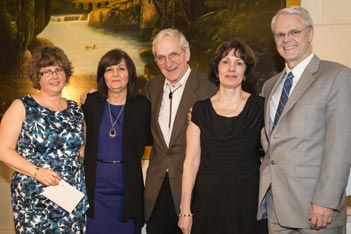
from left to right: Sylvia Perry, Nancy Condo, Martin McKneally, Val Cabral
and James Rutka
The 46 judges for the poster competition as well as the
16 timers, who volunteered their time for the poster judging
deserve special thanks, as well at the Research Committee
members who reviewed and judged the oral presentations.
As we celebrate how great the Day and Evening awards
ceremony went, we need to acknowledge the tremendous
effort it took from everyone involved. The day could not
have gone as well as it did without everyone’s participation
and collaborative efforts. Thanks again this year to Andrea
McCart for assigning the judges to the posters, Joan Lipa
and Gregory Borschel for moderating the sessions, and
Sylvia Perry for making sure the day’s and evening’s preparations
were adhered to. As we enjoyed our meal, we had
a beautiful intermission with enchanting piano playing by
Alex Mine and the Jazz Quartet.
A very special thanks goes to Val Cabral for her outstanding
dedication and hard work to organize the Surgeon
Scientist Training Program, and the Gallie Day events.
Val Cabral with contributions from Michael G. Fehlings
|